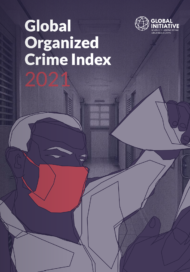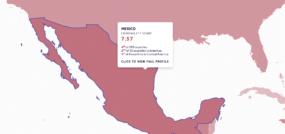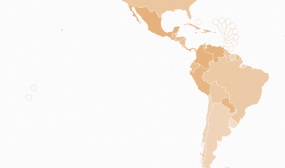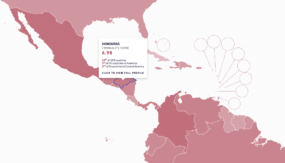In June 2023, the results of the general elections in Guatemala took most of the country by surprise. The outcome of the upcoming run-off election on 20 August could change the country’s political landscape and pave the way for an overhaul of crime and corruption.
According to the 2021 Organized Crime Index, Guatemala is one of the most crime-ridden countries in the world, ranking 23rd globally and 8th in the Americas, with a criminality score of 6.48. Guatemala plays a significant role in the transnational illegal arms trade, serving as a source, transit and destination country. This contributes to high levels of domestic violence – over 80% of homicide victims in the country in 2022 were killed with firearms.
Guatemala also faces challenges in curbing the illegal trade in flora, particularly rosewood, a rare species and source of highly coveted timber. This illicit market is controlled by large criminal organizations working with local farmers and Chinese criminal networks to meet the high demand for rosewood in China. Local criminal organizations are also involved in the production of cocaine and synthetic drugs, markets dominated by domestic and Mexican drug cartels.
Corrupt state-embedded actors in Guatemala collaborate with criminal groups, which is often evident in the involvement of defence authorities in criminality. But how do these criminal actors successfully establish themselves within the state? Their methods vary depending on the level of influence they seek to achieve. A common tactic is to make new appointments when there is a change of government. However, winning elections precedes this process. Any criminal actor seeking a position of power in office would have to participate – directly or indirectly – in the democratic electoral process. Criminal actors benefit from and exploit a weak democratic system to obtain or retain power and perpetuate illicit activities while operating within the state.
A new hope
On 25 June 2023, Guatemala held general elections. The results were surprising. As no presidential candidate received more than 50% of the vote, a run-off will be held on 20 August between the two candidates with the most votes. Manuel Conde of Vamos, the party currently in power, came fourth (with just 7.85% of the vote). Sandra Torres (15.97%) and Bernardo Arévalo (11.74%) came in second and third, respectively. (The ‘null vote’ came out on top with 965 462 votes, or 17.33% of the total – a sign of the general dissatisfaction of the electorate.)
Sandra Torres is a former first lady who is running for president for the third time on the ticket of the Unión Nacional de la Esperanza (National Union of Hope, UNE) party. UNE is the country’s second oldest active party, part of the country’s political establishment, and is seeking to regain power after winning the presidency in 2007.
Arévalo is the candidate of Semilla (Seed), a progressive party born out of the country’s 2015 anti-corruption movement, whose strong stance against corruption appears to have resonated with voters. Unlike rival parties, Semilla is said to have a clean record, untainted by corruption scandals or associations with criminal actors. Although Semilla is not the first party to campaign against corruption, its origins and background have not been linked to criminal structures. This is the second time Semilla has participated in a general election, and the first with a presidential candidate. (The first time Semilla participated in a general election, in 2019, then presidential candidate Thelma Aldana was barred from running.)
Depending on the outcome of the election, Guatemala, positioned in the high criminality band of the Index and in the firm grip of state-embedded actors, may therefore experience a momentous change in its political leadership. This threat to the political establishment has not gone unchallenged. A group of political parties questioned the electoral process, alleging irregularities. In July, the office of the public prosecution authority called for the suspension of Semilla, a request that was blocked by the Constitutional Court. It is believed that the actors making the fraud allegations are colluding with state-embedded criminal actors at all levels of government to ensure their survival. Despite these efforts, the latest polls show Bernardo Arévalo well ahead of Torres.
A roadmap for resilience
In the event that Semilla wins the election, what can be expected from state-embedded actors who will be directly affected? What could the new leadership do to dismantle criminal structures operating from within the state apparatus? And, importantly, how can newcomers with an ambitious anti-corruption agenda implement safeguards to ensure they do not follow in the same footsteps as previous administrations?
The Index’s resilience indicators provide valuable guidance, a roadmap of sorts that could be implemented to address the challenges posed by organized crime. It is essential to review and strengthen transparency and accountability structures to ensure that they are capable of effectively combating transnational organized crime. Embracing international cooperation is crucial to coordinate efforts with other countries to tackle criminal markets that exert significant influence in the region, such as drug trafficking, arms trafficking and human smuggling.
For long-term success of such a strategy, it is necessary to establish comprehensive national policies with robust monitoring and evaluation mechanisms to measure their impact. Law enforcement agencies should prioritize identifying areas at risk of petty corruption and take decisive action to dismantle corrupt structures that have infiltrated the judicial system. It is also important to create space for the active participation of non-state actors, who can help identify hidden issues that investigative journalism plays a crucial role in uncovering. The work of grass-roots civil society organizations within communities is also essential in supporting victims and working on prevention initiatives, thereby building overall resilience to the impact of organized crime.
In any scenario where a country experiences a change in political leadership committed to dismantling corrupt structures, the impact on state-embedded actors would be significant, starting with the trust given by society to the new leadership and their willingness to challenge the status quo. The new leadership should seize the opportunity to confront criminal structures within the government head on and strengthen transparency, accountability and the rule of law. In Guatemala – and other countries facing similar challenges – taking these steps could lead to significant progress in countering organized crime, protecting citizens, and building a safer and more just society.
This analysis is part of the GI-TOC’s series of articles delving into the results of the Global Organized Crime Index 2021. The series explores the Index’s findings and their effects on policymaking, anti-organized crime measures and analyses from a thematic or regional perspective.
¿Una nueva era?
¿Podría un cambio de liderazgo en Guatemala suponer el fin de los actores criminales integrados en el Estado?
En junio de 2023, los resultados de las elecciones generales en Guatemala tomaron por sorpresa a la mayor parte del país. El resultado de la segunda vuelta electoral del 20 de agosto podría cambiar el panorama político del país y abrir la puerta al desmantelamiento del crimen y la corrupción.
Según el Índice global de crimen organizado 2021, Guatemala es uno de los países más castigados por el crimen del mundo, ocupando el puesto 23 a nivel mundial y el octavo en las Américas, con una puntuación de criminalidad de 6,48. Guatemala desempeña un papel importante en el comercio transnacional de armas ilegal, como país de origen, tránsito y destino. Esto contribuye a los altos niveles de violencia: más del 80% de las víctimas de homicidio en el país en 2022 fueron asesinadas con armas de fuego.
Guatemala también se enfrenta al reto de frenar el comercio ilegal de flora, en particular de palo de rosa, una especie rara y fuente de madera muy codiciada. Este mercado ilícito está controlado por grandes organizaciones criminales que trabajan con agricultores locales y redes criminales chinas para satisfacer la elevada demanda de palo de rosa en China. Las organizaciones criminales locales también participan en la producción de cocaína y drogas sintéticas, mercados dominados por los cárteles de la droga nacionales y mexicanos.
En Guatemala, los actores corruptos integrados en el Estado colaboran con grupos criminales, lo que se ha hecho evidente en la implicación de las autoridades de defensa en la criminalidad. Pero ¿cómo consiguen estos actores criminales establecerse con éxito dentro del Estado? Sus métodos varían en función del nivel de influencia que pretendan alcanzar. Una táctica habitual consiste en realizar nuevos nombramientos cuando se produce un cambio de gobierno. Sin embargo, ganar las elecciones precede a este proceso. Cualquier actor criminal que busque una posición de poder tendría que participar, directa o indirectamente, en el proceso electoral democrático. Los actores criminales se benefician y explotan un sistema democrático débil para obtener o conservar el poder y perpetuar actividades ilícitas mientras operan dentro del Estado.
Una nueva esperanza
El 25 de junio de 2023, Guatemala celebró elecciones generales. Los resultados fueron sorprendentes. Como ningún candidato presidencial obtuvo más del 50 % de los votos, el 20 de agosto se celebrará una segunda vuelta entre los dos candidatos más votados. Manuel Conde, de Vamos, el partido actualmente en el poder, quedó en cuarto lugar con solo el 7,85 % de los votos. Sandra Torres (15,97 %) y Bernardo Arévalo (11,74 %) quedaron en segundo y tercer lugar, respectivamente. (El voto nulo quedó primero con 965 462 votos, es decir, el 17,33 % del total, señal del descontento general del electorado).
Sandra Torres es una ex primera dama que se presenta por tercera vez a las elecciones presidenciales por el partido Unión Nacional de la Esperanza (UNE). UNE es el segundo partido activo más antiguo del país y busca recuperar el poder tras ganar la presidencia en 2007.
Arévalo es el candidato de Semilla, un partido progresista nacido del movimiento anticorrupción en Guatemala en 2015, cuya firme postura contra la corrupción parece haber calado entre los votantes. A diferencia de los partidos rivales, Semilla tiene un historial limpio, sin escándalos de corrupción ni asociaciones con criminales. Aunque Semilla no es el primer partido que hace campaña contra la corrupción, sus orígenes y antecedentes no se han vinculado a estructuras criminales. Esta es la segunda vez que Semilla participa en unas elecciones generales, y la primera con un candidato presidencial. (La primera vez que Semilla participó en unas elecciones generales, en 2019, la entonces candidata presidencial Thelma Aldana no pudo presentarse).
Dependiendo del resultado de las elecciones, Guatemala, situada en la franja de alta criminalidad del Índice y bajo el firme control de actores estatales, puede experimentar un cambio trascendental en su liderazgo político. Esta amenaza para la clase política tradicional no ha pasado desapercibida. Un grupo de partidos políticos cuestionó el proceso electoral, alegando irregularidades. En julio, el Ministerio Público pidió la suspensión de Semilla, petición que fue bloqueada por la Corte de Constitucionalidad. Se cree que los actores que hacen las acusaciones de fraude están en connivencia con actores criminales integrados en el Estado en todos los niveles de gobierno para garantizar su supervivencia. A pesar de estos esfuerzos, las últimas encuestas muestran a Arévalo muy por delante de Torres.
Una hoja de ruta para la resiliencia
En el caso en que Semilla ganara las elecciones, ¿qué se puede esperar de los actores estatales que se verán directamente afectados? ¿Qué podrían hacer los nuevos gobernantes para desmantelar las estructuras criminales que operan desde dentro del aparato estatal? Y, lo que es más importante, ¿cómo pueden los recién llegados, con una ambiciosa agenda anticorrupción, aplicar salvaguardias para garantizar que no sigan los mismos pasos que sus predecesores?
Los indicadores de resiliencia del Índice proporcionan una valiosa orientación, una especie de hoja de ruta que podría aplicarse para hacer frente a los retos que plantea el crimen organizado. Es esencial revisar y reforzar las estructuras de transparencia y rendición de cuentas para garantizar que sean capaces de combatir eficazmente el crimen organizado transnacional. Adoptar la cooperación internacional es crucial para coordinar los esfuerzos con otros países para hacer frente a los mercados criminales que ejercen una influencia significativa en la región, como el narcotráfico, el tráfico de armas y el contrabando de personas.
Para que una estrategia de este tipo tenga éxito a largo plazo, es necesario establecer políticas nacionales globales con sólidos mecanismos de seguimiento y evaluación para medir su impacto. Los organismos de seguridad del Estado deben dar prioridad a la identificación de las zonas de riesgo de corrupción y adoptar medidas decisivas para desmantelar las estructuras corruptas que se han infiltrado en el sistema judicial. También es importante crear un espacio para la participación activa de la sociedad civil, que puede ayudar a identificar problemas ocultos que el periodismo de investigación se empeña en sacar a la luz. La labor de las organizaciones de la sociedad civil dentro de las comunidades es esencial para apoyar a las víctimas y trabajar en iniciativas de prevención, creando así una resistencia general al impacto del crimen organizado.
En cualquier escenario en el que un país experimente un cambio de liderazgo político comprometido con el desmantelamiento de las estructuras corruptas, el impacto sobre los actores integrados en el Estado sería significativo, empezando por la confianza otorgada por la sociedad a los nuevos gobernantes y su voluntad de desafiar el statu quo. Los nuevos gobernantes deberían aprovechar la oportunidad para enfrentarse directamente a las estructuras criminales dentro del Gobierno y reforzar la transparencia, la rendición de cuentas y el Estado de derecho. En Guatemala, así como en otros países que se enfrentan a retos similares, la adopción de estas medidas podría suponer un avance significativo en la lucha contra el crimen organizado, la protección de los ciudadanos y la construcción de una sociedad más segura y justa.
Este análisis es parte de una serie de artículos de GI-TOC que profundizan en los resultados del Índice global de crimen organizado 2021. Esta serie explora los hallazgos del Índice y sus efectos en el desarrollo de políticas públicas, en las medidas contra el crimen organizado y aporta análisis desde una perspectiva temática o regional.



